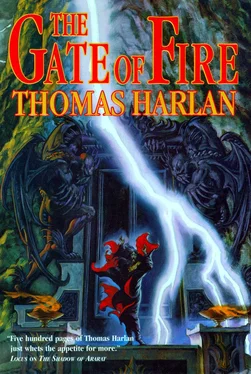Thomas Harlan - The Gate of fire
Здесь есть возможность читать онлайн «Thomas Harlan - The Gate of fire» весь текст электронной книги совершенно бесплатно (целиком полную версию без сокращений). В некоторых случаях можно слушать аудио, скачать через торрент в формате fb2 и присутствует краткое содержание. Жанр: Фэнтези, на английском языке. Описание произведения, (предисловие) а так же отзывы посетителей доступны на портале библиотеки ЛибКат.
- Название:The Gate of fire
- Автор:
- Жанр:
- Год:неизвестен
- ISBN:нет данных
- Рейтинг книги:4 / 5. Голосов: 1
-
Избранное:Добавить в избранное
- Отзывы:
-
Ваша оценка:
- 80
- 1
- 2
- 3
- 4
- 5
The Gate of fire: краткое содержание, описание и аннотация
Предлагаем к чтению аннотацию, описание, краткое содержание или предисловие (зависит от того, что написал сам автор книги «The Gate of fire»). Если вы не нашли необходимую информацию о книге — напишите в комментариях, мы постараемся отыскать её.
The Gate of fire — читать онлайн бесплатно полную книгу (весь текст) целиком
Ниже представлен текст книги, разбитый по страницам. Система сохранения места последней прочитанной страницы, позволяет с удобством читать онлайн бесплатно книгу «The Gate of fire», без необходимости каждый раз заново искать на чём Вы остановились. Поставьте закладку, и сможете в любой момент перейти на страницу, на которой закончили чтение.
Интервал:
Закладка:
There is a fire that fills the heart, driving man to overcome. This is the flame that must be sheltered and given fuel, exalted and inspired. This is the spear of fire.
Then he was gone. Dwyrin blinked. The plain wooden door remained closed, apparently untouched. The air was hot, now, and close. The Hibernian stood and shuffled outside, pulling a ratty old tunic with moth-eaten holes in it over his head.
The night sky was bright with stars and the moon. For an instant, as he stepped out of the building, Dwyrin could have sworn that a glowing white light touched the tops of the olive trees and cypresses that surrounded the encampment. But now it was dark and very quiet.
Somewhere, at one of the farmhouses in the valley, a dog was barking furiously.
– |Dawn was touching the walls of the city when Nicholas returned to the Legion camp. He was bone tired from the effort of wearing half-armor all night and quite irritable. Nestled in the corner of the city, the camp itself was still resting in darkness and it was cold enough for him to see his breath. The centurion stomped up to the gate and waited while the guards on duty opened the wooden barrier.
"Ave," he snarled at them as he stalked inside. The alarms and excursions of the night just past had produced nothing and he thought of his bed-even a hard Legion cot in a drafty room-with longing. The two stonemasons on the watch saluted smartly and refrained from comment. Even Nicholas' jaunty mustaches were drooping.
Once in his chamber, he unstrapped his armor and let it fall in an untidy pile by the door. He noted that Vladimir was not in the pile of blankets the Northerner preferred and wondered if the Walach had risen early or if he simply had not come in yet.
Despite the seeming peacefulness of the surrounding countryside, every dog in the city had begun raising a howl an hour or so before dawn. In response, the governor had sent a runner to request Nicholas' presence at his residence. After several hours of rooting about in the dark and questioning guardsmen and wayward youths who had been up far past their bedtimes, Nicholas had determined that some kind of light in the sky had started the whole thing. No one, however, had seen anything beyond that. There were no Persian spies or bandits or apparitions in evidence. He had discovered that the city was incredibly dark by night and had an unexpected number of stairs. The governor's guards had insisted that someone had been up on the temple platform, that they had heard voices shouting, but there was no sign that anyone had been there.
The squad of men that he had taken up into the city was still there, nosing about in the old ruins. Later in the day, when he had driven the headache away with sleep, he would roust out the engineers and set them to checking the walls for secret entrances or fallen-down sections. The guards at the city gates had not reported any entries after dark. He could not say why, but he knew that something was up. Some prickling on the back of his neck made him uneasy.
CHAPTER FIFTY-SIX
Ecbatana, Persia
Arad sat in deep shade, his hands in his lap, wearing little more than a kilt of black cotton and a leather belt. He sat in a gazebo nestled in a garden behind the old palace. The hoary old granite pile of the palace itself and its halls and chambers lay just to the south. Here, encircled by the walls of the citadel and-on the east and north-by the outer rampart of the city, there was a tiny space filled with flowers and fruit trees and ornamentals of all kinds. In these later days, it had seen little use and many of the plants had gone to seed, or run wild, giving the garden an overgrown look.
The gazebo was old and many of the painted latticework boards were rotting away. Still, within its domed space, ringed about by flowering vines and rosebushes, there was as much privacy and solitude as could be found in the citadel. When the twin Empresses had taken up residence, they had filled half of the old palace with their servants and courtiers and hangers-on. Now that Lord Dahak had come with his army, every inch of the citadel was filled to bursting with his followers. Every nook and cranny and larder had someone sleeping in it.
Each day, now that the word had gone out that the Birds of Paradise had gained a patron of strength, more of the great lords of the land-the spabahadan and the mobeds-appeared at the gates. Each came with a strong guard and many servants, richly dressed and filled with surety of their own importance. Those men were forced to wait, for the twin Empresses had a sufficiency of things to do with their time now that Dahak had settled between them like a sheltering eagle. The idlers of the court had found little shrift in the new regime and all that remained were Dahak's men, or those who bowed before him.
In the late afternoon, as the sun settled in the west and the sky began to darken, the Empresses were wont to sit in the gazebo, surrounded by their maid-servants, in the company of their newly beloved uncle. In this time, the spabahadan were allowed an audience, one nobleman at a time, without any advisors or retainers. The Birds of Paradise would interview, it was understood, and choose those whom they would grace with favor.
This was such a time and Arad sat in the shadows at the rear of the gazebo, silent and still, watching with unwavering eyes.
Lord Dahak sat at ease on a chair of ivory at one side of the gazebo proper. It was draped with a cloth of black silk but bore no other cushion. As was his wont, the sorcerer was dressed in long robes of black and deep gray, with his hair tied back behind his head by a thin scarlet ribbon. Since he had come among the lowland peoples, his appearance had subtly changed, now the seeming of a nobleman lay upon him and his eyes were a dark brown that matched his hair. He wore little jewelry save a single ring on one hand and sometimes, like today, a brooch of worked gold to clasp his cloak at his shoulder. A glass of wine sat close by the chair on a four-legged table of simple wood. Arad had never seen him drink from it.
The change in the twin Empresses was more remarkable, more so that no one in the palace save Arad-and, one presumed, Dahak-had marked upon it. Today, sitting in the slatted sunlight, with a slight breeze passing through the gazebo, each sat at ease on wide chairs of gold and porphyry. They enjoyed silk cushions and glasses of freshly squeezed lemonade cooled by shaved ice. Each wore a simple high-necked traditional gown, finely cut from sheer pale yellow silk. Polished emeralds glittered at their ears and necks, accenting a simple necklace and earrings of beaten gold. Their hair was swept back, making a swan's wing over their shoulders and bound behind in a net of golden thread anchored by garnets. The thick makeup that had turned their faces into masks when Arad had first seen them was gone. A trace of color accented their dark eyes and almost invisible powders smoothed their cheeks, but no more.
Beyond this, each seemed to glow from within with an alluring beauty. Compared to the staggering wealth that they had displayed before, now they showed simple elegance. The plain appearance that they had fought against with overwrought display was gone, replaced by something that drew the hearts of men like a magnet. The scaled black bracelet that Dahak had brought rode like a scepter on Azarmidukht's wrist. So too did Purandokht wear hers as a beloved token. Not too much time passed when they did not, consciously or unconsciously, touch the slick dark metal. Their servants sat quietly, out of the way but ready for a motion or a word to summon them.
The diquan Piruz, who had watched the western gate when Arad first entered the city, knelt before the Birds of Paradise. Many great lords had passed this way before his turn had come, but their names and ranks and provinces were meaningless to Arad. Now, with this half-remembered face before the court, the man in the shadows roused himself to pay attention.
Читать дальшеИнтервал:
Закладка:
Похожие книги на «The Gate of fire»
Представляем Вашему вниманию похожие книги на «The Gate of fire» списком для выбора. Мы отобрали схожую по названию и смыслу литературу в надежде предоставить читателям больше вариантов отыскать новые, интересные, ещё непрочитанные произведения.
Обсуждение, отзывы о книге «The Gate of fire» и просто собственные мнения читателей. Оставьте ваши комментарии, напишите, что Вы думаете о произведении, его смысле или главных героях. Укажите что конкретно понравилось, а что нет, и почему Вы так считаете.











